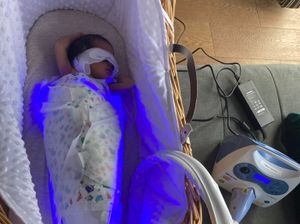Treatment of newborns with jaundice is a first for hospital
A treatment for jaundiced babies which reduces hospital stays for newborns has been used for the first time at Wolverhampton’s New Cross Hospital.

The hospital is now able to provide home phototherapy to newborns who have uncomplicated jaundice and will be more uncomfortable at home than in hospital.
Jaundice is almost universal in newborns, causing yellowing of the skin and eyes from the build-up of a substance in the blood called bilirubin, which is produced when red blood cells break down.
The aim of phototherapy – a therapeutic blue light that lowers bilirubin levels – is to expose newborns’ skin to as much light as possible.
Phototherapy stops when bilirubin levels fall to a safe level, which can take 24 to 48 hours.
Home phototherapy, which can be used in cases of uncomplicated new-born jaundice, sees the baby placed within a blanket containing fibreoptic cables where light travels through and shines on to the baby’s back.
Advantages are reduced or no stays in hospital and family-centred care and parental satisfaction.
This service has been funded by the Local Maternity Neonatal Services which has supplied six portable medical devices supplying blue light for Wolverhampton Neonatal Community Outreach Team.
Himmat Singh Uppal was the first recipient of phototherapy after he was born at New Cross on February 2.
After going home, his blood test results showed he was over the threshold for jaundice so he was re-admitted to the hospital.
He spent a night undergoing conventional phototherapy at New Cross, but when this proved stressful and uncomfortable for him, it was decided they would try home phototherapy.
This proved successful and brought down his levels, which are monitored daily by a nurse who visits the family at their home in Wednesfield.
His mother, Kiranjit Kaur Uppal, said: “For us it’s been a godsend. It’s enabled us to care for our newborn at home as a family and we are really grateful we were offered this opportunity.
“Having our baby at home under a blanket has been more effective and we have seen a drop in the jaundice levels. We strap him into the blanket and he seems very settled and able to sleep better.
"We would like to thank the entire team of nurses and doctors at New Cross who have worked with us throughout the treatment to make things as comfortable and effective for us.”
Kate Cheshire, deputy head of nursing and midwifery at the hospital, said: “Being able to treat jaundice with phototherapy to otherwise healthy babies at home is a fantastic service that I’m proud to introduce.
“This represents the first of a number of new initiatives that the fantastic Wolverhampton Neonatal Community Outreach Team is working on to improve care and support for families.
“Historically, phototherapy has involved long hospital stays and a separation of the family unit, potentially interfering with bonding with a new baby.
“It is essential this team of experienced neonatal nurses is taking hospital care into the home while still having the option to transfer directly into the postnatal ward if the need arises.”




